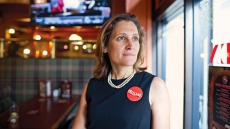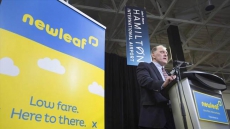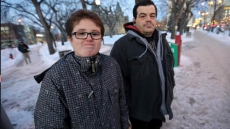THUNDER BAY, Ont. — The fading hardwood floor of the old church, littered with pigeon feathers and dried bird droppings, creaks with every step. Below it, in the basement, is where Vince Maratt and five other tenants call home.
Maratt can afford it, and "it's a place to sleep," he says. Still, he wants out.
Justin Trudeau's Liberal government has promised to invest in affordable housing. The details — how much it will spend, how many units it will build — are expected in next week's federal budget.
The promised spending on "social" infrastructure has raised hopes across the country. Municipalities are optimistic that the investment, which experts say has been shrinking since the 1990s, will reduce homelessness across Canada.
In Thunder Bay, where new research shows the problem is most acute, hopes are even higher: Patty Hadju, a newly elected MP and a former director of the city's largest shelter, has a seat at the Liberal cabinet table.
Anti-poverty advocates say they expect the government to put hundreds of millions in new spending into an existing homeless program, the Homeless Partnering Strategy, and fund new affordable housing units, helping those in shelters, temporary or shabby housing because they can't afford rent.
In Hamilton alone, 77 per cent of homeless people reported the cost of housing was their biggest hurdle to finding a home.

Yvonne Hunter, who spent two years on Thunder Bay streets before finding what she described as substandard but affordable housing, said she has a friend in the hospital whose opportunity to find a home may come too late.
"He has been waiting for housing for four years," she says. "He's been on a waiting list for four years and now he's so ill, he's not even going to have a chance to have housing."
A dent in the list may be the best the federal government can hope for. An internal government report from 2014, obtained by The Canadian Press under the Access to Information Act, suggested that cutting shelter use by even one-fifth may be overly ambitious and difficult to achieve nationally.
The report from researchers at Employment and Social Development Canada said it would be unlikely that the heaviest shelter users, who make up a "disproportionate amount of bednights," would land a government-funded placement under the "Housing First" program.
That would make it difficult to cut bednights — nights during which a shelter bed is occupied, a number that currently stands at four million a year — by even 20 per cent, the report concluded. A 75 per cent reduction in bednights was described as "completely unrealistic."
The paper said it was unlikely big cities could house all of their chronic and episodic shelter users, but "conceivable " for smaller cities.

"At the national level, achieving a 20 per cent reduction in bednights used would require (housing first) placements for hundreds of people in the larger cities. Removing a handful of clients from the shelter system in small communities will have little effect on national numbers."
Thunder Bay has been able to find social housing for some of the city's homeless, but it has done little to reverse the tide of people sleeping in front of buildings and homes downtown, or panhandling for change north of the downtown.
Thunder Bay Mayor Keith Hobbs says a good start to curbing homelessness in his city would be to build 100 units, but they need federal help to make that happen.
Anti-poverty advocates like Nick Falvo say they believe shelter usage may not necessarily drop as cities start to build more affordable housing units.
Instead, those who are precariously housed — spending more than one-third of their income on rent, for instance — might seek out emergency shelters in order to get a crack at low-cost housing.
People who can afford it will avoid shelters over concerns about violence, bedbugs, lice and drugs, which means the number of shelter users are "not a true reflection of the need" for affordable housing, said Falvo, director of research and data at the Calgary Homeless Foundation.
There is anecdotal evidence of cities moving shelter users into emergency housing, only to find shelter use goes up, he says.
"Somehow people just keep coming in," Falvo says of what he's heard. "It's like pushing the ocean back with a spoon."

That might well include people like Maratt. There's a need for better quality, affordable housing for people on the street, or those who are struggling, and who want a roof over their head, he says. And he's putting some of his faith in the newest occupant of the Prime Minister's Office in Ottawa.
"I think Prime Minister Trudeau, he might turn things around. I voted for him. I never voted in 20 years," says Maratt, 58.
"I believe in him. I believed in his father and I believe in him."





